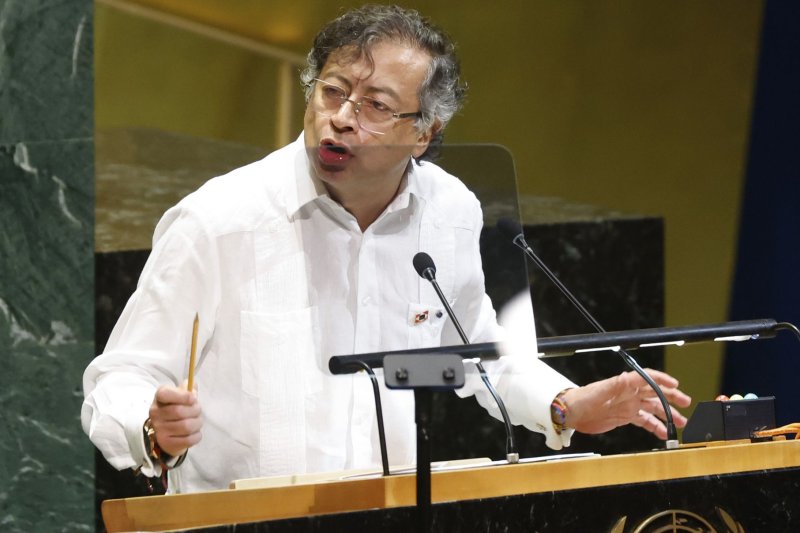World
Colombia Accuses U.S. of Breaching International Law over Petro’s Visa

Colombia’s Foreign Ministry has accused the United States of violating international law following the revocation of President Gustavo Petro‘s visa. This action came after Petro made a controversial statement during a pro-Palestinian rally in New York, where he urged U.S. troops to disobey orders. The U.S. government announced the visa revocation on September 29, 2023, citing Petro’s remarks as incitement to violence.
In a statement, Colombia’s Foreign Ministry argued that the decision reflects a misuse of a resolution from the Trump administration, characterizing it as a “diplomatic weapon.” They asserted that this action contradicts the principles outlined in the 1945 United Nations Charter, which emphasizes the importance of protecting freedom of opinion and expression without borders.
The U.S. State Department took to X (formerly Twitter) to explain its decision, stating, “Earlier today, Colombian President @petrogustavo stood on a New York street and urged U.S. troops to disobey orders and incite violence. We will revoke Petro’s visa due to his reckless and incendiary actions.”
During the rally, Petro called for “the nations of the world” to unite in creating an army “larger than that of the United States” to support Palestinians, insisting that U.S. troops “should not point their rifles against humanity.” Following the revocation, Petro expressed his discontent upon returning to Colombia, remarking, “The fact that the Palestinian Authority was not allowed entry and that my visa was taken away for asking the U.S. and Israeli armies not to support a genocide, which is a crime against all humanity, shows that the U.S. government no longer complies with international law.”
In light of the escalating tensions, Petro suggested relocating the United Nations headquarters from New York to Doha, the capital of Qatar. He emphasized the need for a neutral host country that would enable the UN to operate in accordance with international law, free from political pressures.
During his address to the UN General Assembly earlier in the week, Petro did not shy away from criticizing former President Donald Trump, labeling him an “accomplice to genocide” in Gaza. He urged the UN to enforce its resolutions concerning the conflict and proposed a “criminal proceeding” against Trump for military actions that targeted boats in the Caribbean, which the U.S. claimed were involved in drug trafficking.
On September 16, 2023, the Trump administration had labeled Colombia as “decertified,” placing it on a list of countries perceived to have “demonstrably failed” in the fight against drug trafficking. Despite this designation, the U.S. granted a waiver to continue cooperation and avoid sanctions. Petro described this move as political interference, arguing it was an attempt by Washington to impose a “puppet president” in Colombia. He connected the decertification to his outspoken stances on issues concerning Gaza and environmental policy.
The situation reflects the complex relationship between Colombia and the United States, where diplomatic maneuvers intertwine with broader geopolitical issues. As tensions rise, the implications of these actions may resonate beyond the immediate fallout, impacting future diplomatic engagements and international perceptions.
-

 Lifestyle5 months ago
Lifestyle5 months agoLibraries Challenge Rising E-Book Costs Amid Growing Demand
-

 Sports4 months ago
Sports4 months agoTyreek Hill Responds to Tua Tagovailoa’s Comments on Team Dynamics
-

 Sports4 months ago
Sports4 months agoLiverpool Secures Agreement to Sign Young Striker Will Wright
-

 Lifestyle4 months ago
Lifestyle4 months agoSave Your Split Tomatoes: Expert Tips for Gardeners
-

 Lifestyle4 months ago
Lifestyle4 months agoPrincess Beatrice’s Daughter Athena Joins Siblings at London Parade
-

 Science4 months ago
Science4 months agoSan Francisco Hosts Unique Contest to Identify “Performative Males”
-

 World4 months ago
World4 months agoWinter Storms Lash New South Wales with Snow, Flood Risks
-

 Science5 months ago
Science5 months agoTrump Administration Moves to Repeal Key Climate Regulation
-

 Business5 months ago
Business5 months agoSoFi Technologies Shares Slip 2% Following Insider Stock Sale
-

 Science5 months ago
Science5 months agoNew Tool Reveals Link Between Horse Coat Condition and Parasites
-

 Sports5 months ago
Sports5 months agoElon Musk Sculpture Travels From Utah to Yosemite National Park
-

 Science5 months ago
Science5 months agoNew Study Confirms Humans Transported Stonehenge Bluestones









